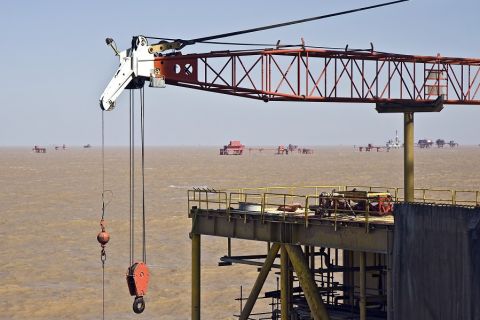Editor's note: This story was updated with new information from its original post on March 17.
BAKU, Azerbaijan—OPEC is set to scrap its planned meeting in April and decide instead whether to extend oil output cuts in June, when the market will be able to assess the full impact of U.S. sanctions on Iran and the crisis in Venezuela.
A ministerial panel of OPEC and its allies recommended on Monday that they cancel the extraordinary meeting scheduled for April 17-18, which means the next regular talks would be held on June 25-26.
The energy minister of OPEC's de facto leader, Saudi Arabia, said over the weekend that the market was looking oversupplied until the end of the year but that April would be too early for any decision on output policy.
"The consensus we heard ... is that April will be premature to make any production decision for the second half," the Saudi minister, Khalid al-Falih, said on Monday.
"As long as the levels of inventories are rising and we are far from normal levels, we will stay the course, guiding the market towards balance," he added.
The United States has been increasing its own oil exports in recent months while imposing sanctions on OPEC members Venezuela and Iran in an effort to reduce those two countries' shipments to global markets.
Washington’s policies have introduced a new level of complication for the Organization of the Petroleum Exporting Countries as it struggles to predict global supply and demand.
"We are not under pressure except by the market," Falih told reporters before the Joint Ministerial Monitoring Committee (JMMC) meeting in the Azeri capital, Baku, when asked whether he was under U.S. pressure to raise output.
U.S. President Donald Trump has been a vocal critic of OPEC, blaming it for high oil prices. Many OPEC members have said Trump's sanctions policies have elevated the market.
OPEC and its allies agreed in December to cut output by 1.2 million barrels per day - 1.2 percent of global demand - during the first half of this year in an effort to boost prices.
The JMMC, which also includes non-OPEC Russia, monitors the oil market and conformity with supply cuts.
Asked if he had been updated on whether Washington would extend its waivers for buyers of Iranian crude, which are due to end in May, Falih said: "Until we see it hurting consumers, until we see the impact on inventory, we are not going to change course."
Inventory levels and oil investments are the two main factors guiding OPEC's action, Falih said, adding that oil industry estimates show that $11 trillion of investments will be needed over the coming two decades to meet demand growth. Oil inventories in developed countries continue to fluctuate, he said.
Falih said on March 17 OPEC's job in rebalancing the oil market was far from done as global inventories were still rising despite harsh U.S. sanctions on Iran and Venezuela, signaling it may need to expand output cuts into the second half of 2019.
Russia, which is cutting oil output in tandem with OPEC, also said production cuts would stay in place at least until June, when Washington's next steps on reducing Iran's and Venezuela's oil exports become clearer.
The United States has been increasing its own oil exports steeply in recent months while imposing sanctions on Venezuela and Iran to reduce their shipments to global markets.
Washington's policies have introduced a new level of uncertainty for OPEC as it struggles to predict the balance of global supply and demand.
"My assessment is that the job still remains ahead of us... We are still seeing inventory builds... We need to stay the course certainly until June," Falih said on March 17.
"We like to remain ready to continue monitoring supply and demand and do what we have to do in the second half," said Falih as some OPEC ministers met in the Azeri capital of Baku for the monitoring committee of OPEC and its allies like Russia.
OPEC and its allies have cut output by 1.2 million barrels per day (MMbbl/d)—or 1.2% of global demand—since January to help rebalance the global oil market and prop up prices.
The U.S. has imposed stiff sanctions on OPEC's third largest oil producer, Iran, but has given some waivers to buyers of its crude until May.
Washington is also trying to oust Venezuela's current president, Nicolas Maduro, and has imposed sanctions on that country's oil.
Russian Energy Minister Alexander Novak said it was hard for Moscow and OPEC to plan due to the U.S. sanctions. He said they would have little additional information by their next meeting in April, given that Washington will not yet have announced its new waivers on Iran and that more talks would be needed in May.
"Those sanctions are creating negative trends in the market and are completely distorting the supply and demand picture... They are imposed to help sell goods of the country that is imposing the sanctions, and they create uncertainty," he said.
Russia has been slow to cut its oil output in line with January targets, saying it is difficult to do so in winter.
Saudi Arabia has therefore cut its own oil output to well below its targets to compensate for other producers but Falih said this would not "continue indefinitely".
Novak said Russia was now approaching full compliance and was close to cutting 140,000 bbl/d. Falih said Saudi exports would remain below 7 MMbbl/d in April and March.
Recommended Reading
Oceaneering Won $200MM in Manufactured Products Contracts in Q4 2023
2024-02-05 - The revenues from Oceaneering International’s manufactured products contracts range in value from less than $10 million to greater than $100 million.
E&P Highlights: Feb. 5, 2024
2024-02-05 - Here’s a roundup of the latest E&P headlines, including an update on Enauta’s Atlanta Phase 1 project.
CNOOC’s Suizhong 36-1/Luda 5-2 Starts Production Offshore China
2024-02-05 - CNOOC plans 118 development wells in the shallow water project in the Bohai Sea — the largest secondary development and adjustment project offshore China.
TotalEnergies Starts Production at Akpo West Offshore Nigeria
2024-02-07 - Subsea tieback expected to add 14,000 bbl/d of condensate by mid-year, and up to 4 MMcm/d of gas by 2028.
US Drillers Add Oil, Gas Rigs for Third Time in Four Weeks
2024-02-09 - Despite this week's rig increase, Baker Hughes said the total count was still down 138 rigs, or 18%, below this time last year.




